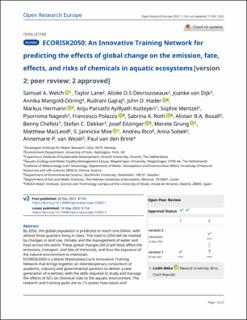ECORISK2050: An Innovative Training Network for predicting the effects of global change on the emission, fate, effects, and risks of chemicals in aquatic ecosystems
Welch, Samuel Alexander Stafford; Lane, Taylor; Desrousseaux, Alizée O.S; van Dijk, Joanke; Mangold-Döring, Annika; Gajraj, Rudrani; Hader, John D.; Hermann, Markus; Parvathi Ayillyath Kutteyeri, Anju; Mentzel, Sophie; Nagesh, Poornima; Polazzo, Francesco; Roth, Sabrina K.; Boxall, Alistair B.A.; Chefetz, Benny; Dekker, Stefan C.; Eitzinger, Josef; Grung, Merete; MacLeod, Matthew; Moe, S. Jannicke; Rico, Andreu; Sobek, Anna; van Wezel, Annemarie P.; van den Brink, Paul
Peer reviewed, Journal article
Published version
Permanent lenke
https://hdl.handle.net/11250/3057752Utgivelsesdato
2022Metadata
Vis full innførselSamlinger
- Publikasjoner fra Cristin - NIVA [2160]
- Scientific publications [1172]
Sammendrag
By 2050, the global population is predicted to reach nine billion, with almost three quarters living in cities. The road to 2050 will be marked by changes in land use, climate, and the management of water and food across the world. These global changes (GCs) will likely affect the emissions, transport, and fate of chemicals, and thus the exposure of the natural environment to chemicals.
ECORISK2050 is a Marie Skłodowska-Curie Innovative Training Network that brings together an interdisciplinary consortium of academic, industry and governmental partners to deliver a new generation of scientists, with the skills required to study and manage the effects of GCs on chemical risks to the aquatic environment. The research and training goals are to: (1) assess how inputs and behaviour of chemicals from agriculture and urban environments are affected by different environmental conditions, and how different GC scenarios will drive changes in chemical risks to human and ecosystem health; (2) identify short-to-medium term adaptation and mitigation strategies, to abate unacceptable increases to risks, and (3) develop tools for use by industry and policymakers for the assessment and management of the impacts of GC-related drivers on chemical risks.
This project will deliver the next generation of scientists, consultants, and industry and governmental decision-makers who have the knowledge and skillsets required to address the changing pressures associated with chemicals emitted by agricultural and urban activities, on aquatic systems on the path to 2050 and beyond.

